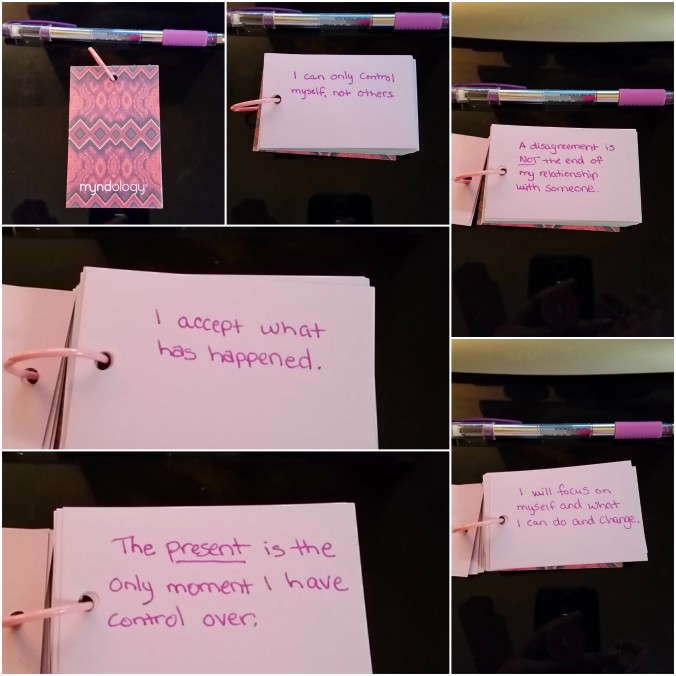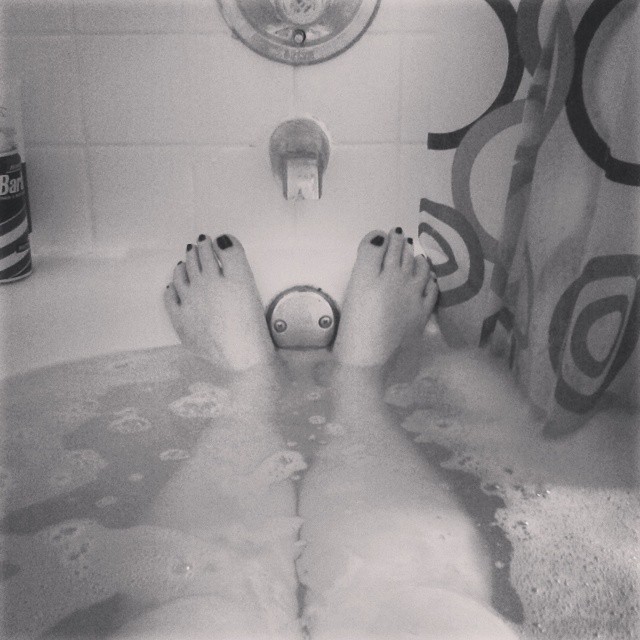So what in the actual hell is radical acceptance? Let me lay out a scenario for you from my life:
I’m married to an amazing human, Daniel. He’s amazing to and for me. He loves me. He cares for me. He comforts me. But, just like any human, he is flawed. One of Daniel’s biggest challenges is not shutting down when we have a disagreement. One of my biggest challenges is not pushing him when he shuts down. I am not one to immediately run away from confrontation or disagreements. In fact, I’m the sort that will keep pushing, and pushing, and pushing, until I metaphorically push the person off a cliff. It’s something I know about myself that isn’t exactly the healthiest approach to disagreements. There are some folks that just cannot handle a disagreement in one sitting. Some people need time to process, to think, to gather their thoughts, and then readdress the issue when they are clear in their minds and able to communicate their thoughts concisely. That would be Daniel.
Early in our relationship in nearly every disagreement he would shut down and I would push for further communication until he had to get his keys and leave. I’ll tell you, for someone with BPD, a partner who leaves is overwhelmingly emotional. I would begin to think that our relationship was over, that he didn’t love me, and that I had ruined everything. Then, I would become angry and upset, wanting to blame him, instead of looking at myself and what I could do differently. I would stew over the disagreement having happened in the first place because “how could he just shut down like that?” Why was it so damned difficult for him to have a discussion? Why did he feel attacked when all I was trying to do was communicate? Why did he have to leave, leaving me all alone and feeling abandoned?
This is where radical acceptance changed this narrative. Radical acceptance is about changing your attitude. As the The Dialectical Behavior Therapy Skills Workbook states, “The other option, which radical acceptance suggests, is to acknowledge your present situation, whatever it is, without judging the events or criticizing yourself. Instead, try to recognize that your present situation exists because of a long chain of events that began far in the past.” [page 10, McKay, Wood, & Brantley].
Yeah, I know, this seems easier said than done. I get it. It’s not an overnight change. But, here’s the deal, when has being angry over an event changed the event? When has stewing about an event ever made it any different, or resolved the issue? You can’t change what has been done. All you can do is radically accept that it has happened and refocus your attention on what you CAN DO. Radical acceptance is seeing a situation and yourself as it really is, not as you wish it had been. This is huge for someone with BPD. I have wasted innumerable hours, probably years, focusing on how I thought it should have been. I have to say, I want all that time back, but it is gone, and now I have to accept what happened, happened. I have to accept that I can never change the past. I have to accept that though I can’t change the past, I can refocus my attention on what I can do now, in this moment.
So how does this change the narrative between myself and Daniel. Well, it has actually changed our relationship in a huge way. I no longer push him to talk when he cannot talk. I give him space to think. I practice radical acceptance and walk away, giving him the dignity of his personal thought processing, and giving myself the dignity of respecting his needs. I radically accept that we are different people. I radically accept that sometimes we have to take a break when we disagree, go to our separate corners, and readdress the issue later. It isn’t easy for me. I have to calm myself down using coping statements that reaffirm what radical acceptance is, and why it’s important. Here are a few statements that I use:
- “The present is the only moment I have control over.”
- I can only control myself, not others.
- “This moment is exactly as it should be, given what’s happened before it.”
- “This moment is the result of over a million other decisions.”
- You can choose to accept this moment, as it is, and refocus your attention on what you can do.
- I must respect the needs and boundaries of others, and accept that they are different from myself.
- A disagreement is not the end of my relationship with someone.
- I accept what has happened.
- I will focus on myself and what I can do and change.
[Those in quotations are from the workbook, page 11]
One of the most awesome things about radical acceptance is it isn’t just for relationships. It can be used and practiced in every area of life. For instance, I live with chronic pain 24/7/365. The pain is all over my body, presenting in different ways. Before I started practicing radical acceptance I use to sit and mentally fight with the pain, being angry that I even had pain, and wondering why I had to suffer. But, radical acceptance has helped me accept that I am in pain and being angry about it, and questioning “why me” is not going to change that I am in pain. In fact, most of the time, in that mental paradigm, it simply makes the pain worse, amplifying it. With radical acceptance, I focus on what I can do. I CAN take my pain medications as prescribed. I CAN do physical therapy as prescribed. I CAN refocus my mind on something I enjoy doing, like creating art. I CAN offer comfort and support to others experiencing the same. I CAN live a full life, full of joy and happiness despite the pain.
As you can see, starting with radical acceptance can change your life, well, radically. This is a starting point for those with BPD. And, it’s a good starting point because those with BPD have a really hard time with acceptance. I know I did, and still do, which is why I have to practice radical acceptance every day. Something that I have done is to write my statements of radical acceptance down in a mini-note card book. I bought it at Wal-Mart for $1.88, but you can make your note cards out of anything. You can write them down, and stick them to your bedroom wall, or anywhere that you feel they will remind you of radical acceptance. Writing them down also has the added benefit of helping you remember your statements of radical acceptance. I encourage anyone with BPD, and even those without the BPD diagnosis who are simply trying to learn acceptance, to write their statements down and refer to them anytime they need a reminder.

I hope that today’s blog is helpful. For anyone with questions, feel free to message. Please remember that I am not a therapist, or a healthcare provider. I’m just another human in recovery from borderline personality disorder. I encourage anyone to seek help from licensed mental healthcare professionals if you feel you may have BPD, or you have already been diagnosed with BPD.
As always, if anyone is feeling suicidal, please contact 911, or the National Suicide Prevention Hotline at 1-800-273-8255. You are not alone, and death is not the answer.






